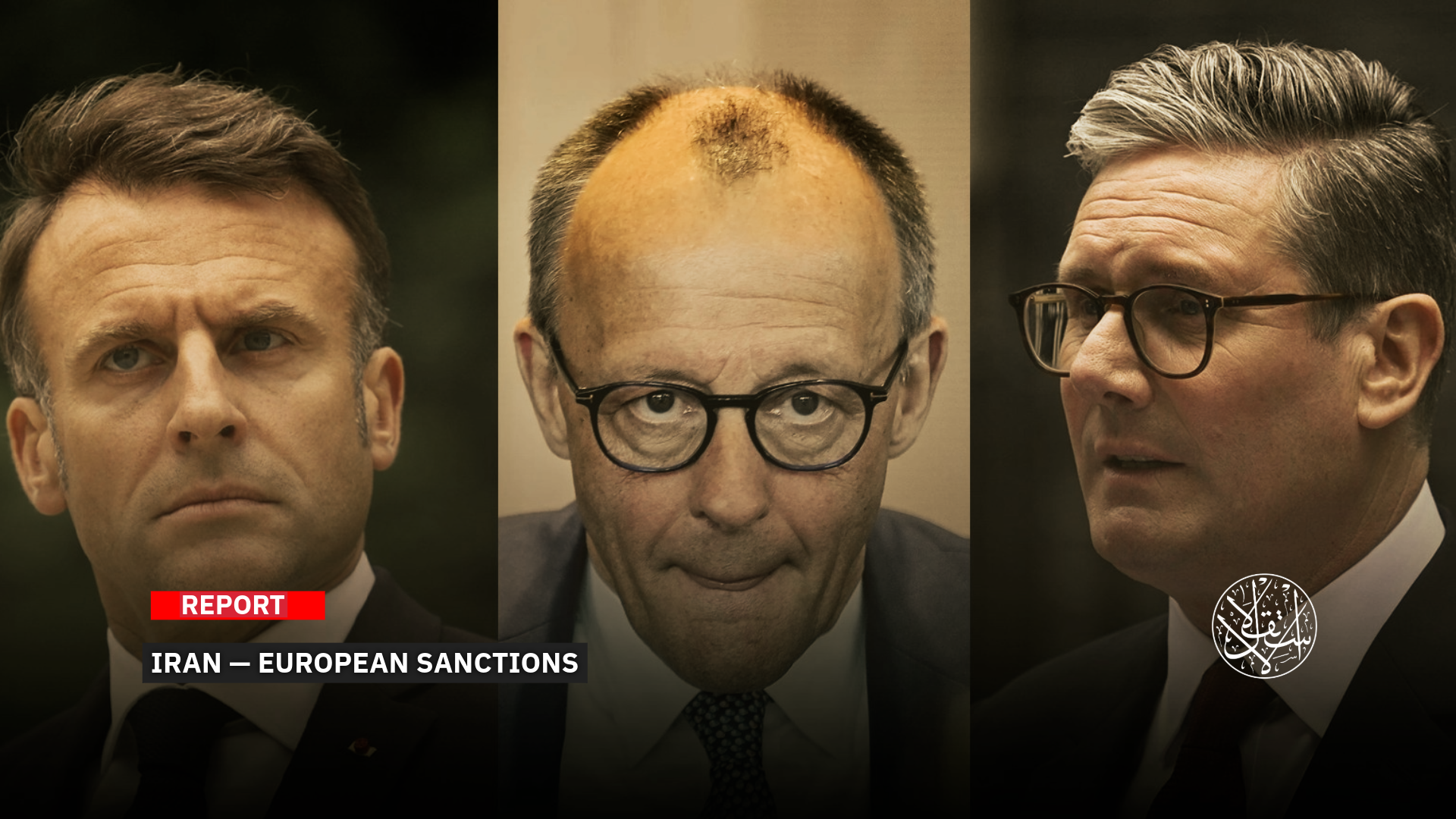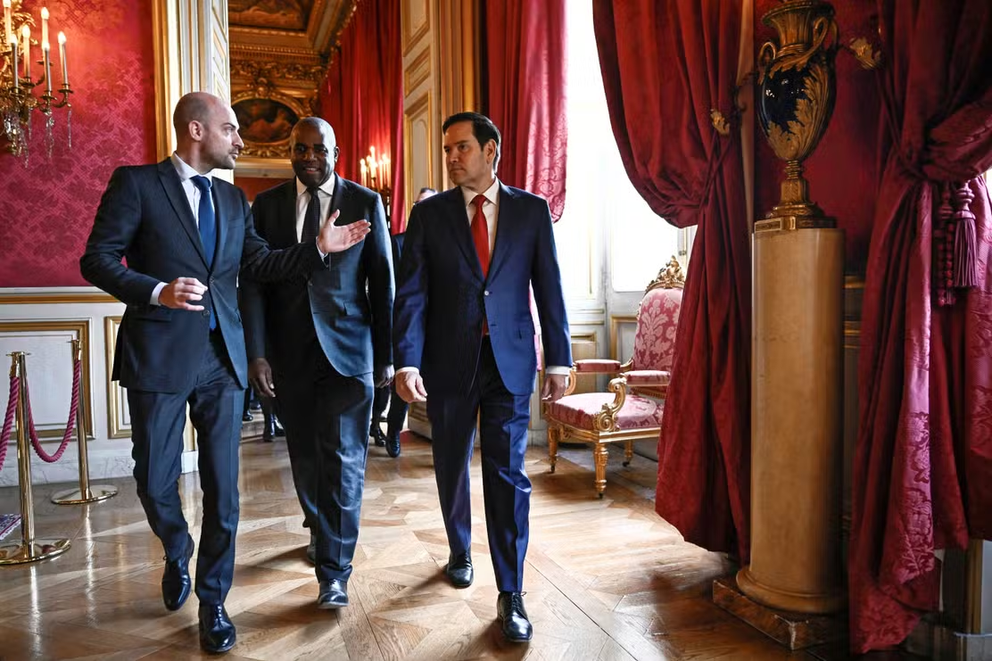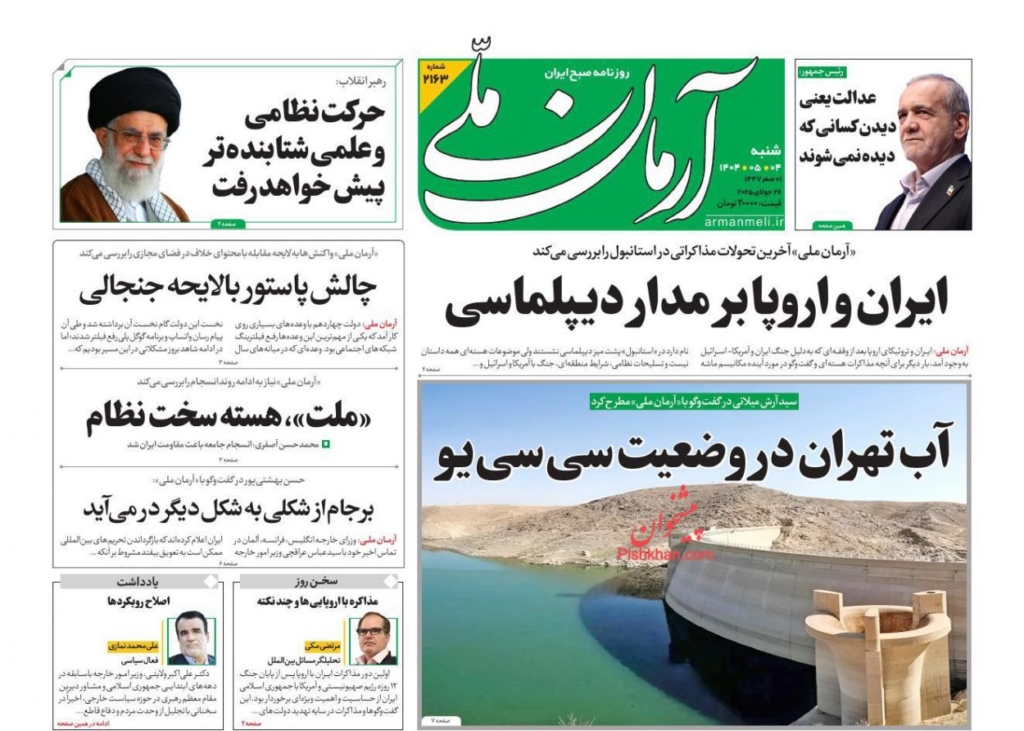Snapback Mechanism Looms: What’s Behind the European Troika’s Deadline for Iran?

The European troika and the U.S. set the end of August as the final deadline for Iran to agree to a deal.
The European Troika, in agreement with the United States, has set the end of August 2025 as the final deadline to reinstate the snapback mechanism on Iran, unless Tehran shows cooperation with the International Atomic Energy Agency and returns to the diplomatic path.
The threat to activate the snapback mechanism, which would reinstate United Nations sanctions on Iran, came just one day after a round of talks concluded between Iranian officials and a delegation from the European troika in Istanbul on July 26, 2025.
Joint Agreement
The deadline was agreed upon by British Prime Minister Keir Starmer, French President Emmanuel Macron, and German Chancellor Friedrich Merz, following earlier coordination between their governments and the United States.
According to a statement issued by Starmer’s office on July 26, the agreement was reached during a phone call among the three leaders. The discussion also covered developments related to Iran, Gaza, and Ukraine.
On July 16, Axios reported, citing three sources, that U.S. Secretary of State Marco Rubio and his counterparts from France, Germany, and the United Kingdom had agreed in a phone call to set the end of August as the de facto deadline for reaching a nuclear deal with Iran.
The sources said the call took place on July 14, 2025, and was intended to align the positions of the four countries on triggering the snapback mechanism and determining the future course of diplomacy with Iran.
According to the report, the three European countries are planning to activate the snapback mechanism if no deal is reached by the end of August. This would automatically reinstate all international sanctions that were imposed by the United Nations Security Council prior to the 2015 nuclear agreement.
The snapback provision, which was included in the original 2015 deal, is scheduled to expire on October 18, 2025. Since the mechanism takes about 30 days to go into effect, the European countries are aiming to initiate the process before Russia assumes the rotating presidency of the UN Security Council in early October.
After Israeli and U.S. attacks on nuclear facilities during the twelve-day aggression against Iran in June 2025, Tehran suspended its cooperation with the International Atomic Energy Agency.
While renewing talks with the European troika, Iran has also shown willingness to resume negotiations with the United States as long as its right to enrich uranium on its own soil is respected.
Iran has previously warned both the European countries and the United States that it would withdraw from the Treaty on the Non-Proliferation of Nuclear Weapons if UN sanctions are reimposed.
The 2015 nuclear deal was signed between Iran and the five permanent members of the United Nations Security Council, the United States, France, the United Kingdom, China, and Russia, along with Germany. However, in 2018, the United States unilaterally withdrew and reimposed economic sanctions on Iran.

A Three-Way Alignment
Inside Iran, Western threats to reinstate sanctions have sparked strong reactions across the local media. Several outlets described the move as political bullying, carried out in an atmosphere of pressure and blackmail, and warned of an emerging three-way alignment involving the Israeli Occupation, the United States, and Europe.
Iranian writer Mohammad Safari argued that the snapback mechanism, which the European troika has threatened to activate, lacks any legal basis. He maintained that reimposing United Nations sanctions under that mechanism constitutes political coercion aimed at imposing Western demands on Iran.
In a column published on July 26 by the conservative newspaper Siasat-e Rooz, Safari questioned the usefulness of past negotiations with the West, especially the nuclear deal, which he said had yielded nothing but broken promises from the other side.
He argued that Iran fully complied with all provisions of the nuclear agreement, while the United States withdrew unilaterally and Europe failed to meet its obligations. Despite this, he noted, the snapback mechanism is now being used as a pressure tool against Tehran, even though he believes it lost its legal standing after the United States withdrew from the deal.
Safari stated that the three European countries, Britain, France, and Germany, are threatening to activate the snapback mechanism if Iran does not meet their conditions. He said this was evident in the latest round of talks in Istanbul, which he described as taking place amid threats and political blackmail, rather than within a legitimate legal framework.
He concluded that the snapback mechanism is merely a means of political pressure and has no legal foundation under the current circumstances of the nuclear deal. For Safari, Europe is simply trying to buy time and postpone declaring the mechanism defunct ahead of the agreement’s expiration in October 2025.
Iranian political analyst Morteza Makki wrote that the key development in the Istanbul negotiations was the shift in the European role. Rather than acting as neutral mediators, he said, the Europeans have begun to reflect the same demands put forward by the United States and Israel, indicating a clear three-way alignment against Iran.
In an article published on July 26 by the reformist daily Arman-e Melli, Makki explained that Tehran is seeking to use every diplomatic opportunity to prevent the activation of the snapback mechanism. For that reason, it welcomed the resumption of dialogue with the Europeans, even though the first round is unlikely to produce tangible results. So far, he noted, the only outcome has been the setting of a deadline at the end of August, with no official European statement issued afterward.
Makki added that any agreement with the Europeans might open the door for broader negotiations with Washington. He urged that diplomats be allowed the space to operate in the coming stage, warning that activation of the snapback mechanism would reinstate international sanctions and significantly worsen Iran’s political and economic conditions.

A Possible Maneuver
On the other hand, Iraqi writer Mohammed al-Khuzai argued that the deadline set by the European countries is not arbitrary but based on several calculations. One of these, he said, may involve allowing time for United States and Israeli military preparations ahead of a potential surprise strike on Iran.
In a column published by the Iraqi newspaper Almowaten on July 22, al-Khuzai wrote that the timing could indicate one of two possibilities. The first, according to him, is political pressure aimed at extracting concessions from Iran.
He suggested that the deadline might be part of a brinkmanship maneuver intended to push Tehran toward making major concessions, such as handing over enriched uranium, halting enrichment, or allowing full access to inspectors, without resorting to war.
Al-Khuzai noted that similar threats have often been used in advance of surprise military attacks, citing the lead-up to the 2003 invasion of Iraq, when Saddam Hussein was given a deadline to surrender what turned out to be nonexistent weapons.
The second possibility, he explained, is that the deadline could be a prelude to “military action.” If Iran does not comply, the return of United Nations sanctions through the snapback mechanism might serve as the political and legal justification for a limited strike. He added that “Israel” is well known for its policy of “preemptive military action.”
The European Center for Counterterrorism and Intelligence Studies (ECCI) stated that recent developments in Iran’s nuclear file reveal increasing challenges for Europe. These include deepening distrust between Tehran and European capitals and the diminishing ability of the European Union to exert meaningful influence.
In a report published on July 21, the center emphasized that the current geopolitical situation, which involves escalating military pressure led by “Israel” with support from the United States, is weakening the prospects for a diplomatic resolution. This remains the case despite European efforts to revive dialogue with Iran.
Internal divisions, a lack of political resolve, and an overdependence on United States policy now constrain Europe. This is especially evident under the renewed leadership of President Donald Trump, whose unilateral approach has sidelined European collective diplomacy.
The report also noted that Tehran no longer considers Europe a reliable partner, and is therefore strengthening its ties with allies in the East.
Europe will continue to have only a limited role unless it reevaluates its strategy in the Middle East and adopts an independent and pragmatic diplomatic posture. It warned that reimposing sanctions will only deepen the current deadlock unless accompanied by new negotiations that provide Iran with real economic and security guarantees.
The report concluded that the future of the nuclear agreement depends on political will, which is currently lacking, and on regional developments that may eventually compel the involved parties to return to the negotiating table. For this reason, it called on the European Union and its member states to pursue an independent foreign policy that is not subject to United States influence.
The center also stressed the importance of Europe overcoming internal divisions on Middle East issues and adopting a unified, effective stance. It called for updating the negotiation framework to address wider regional security concerns.
Sources
- How the Snapback Mechanism Brings Back Sanctions on Iran?
- UK, French, and German Leaders Threaten to Implement Snapback Mechanism Against Iran by End of August [Arabic]
- The US and European Troika Set End of August Deadline for Nuclear Deal with Iran [Arabic]
- Giving Iran Until the End of August 2025: A Political-Military Maneuver [Arabic]
- Can the European Troika Succeed in Bringing Iran Back to the Negotiating Table? [Arabic]
- The Threat of the Snapback Mechanism Doesn’t Rule Out Negotiations [Arabic]











